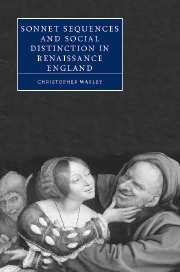Book contents
- Frontmatter
- Contents
- Preface
- 1 Sonnet sequences and social distinction
- 2 Post-romantic lyric: class and the critical apparatus of sonnet conventions
- 3 “An Englishe box”: Calvinism and commodities in Anne Lok's A Meditation of a Penitent Sinner
- 4 “Nobler desires” and Sidney's Astrophil and Stella
- 5 “So plenty makes me poore”: Ireland, capitalism, and class in Spenser's Amoretti and Epithalamion
- 6 “Till my bad angel fire my good one out”: engendering economic expertise in Shakespeare's Sonnets
- 7 “The English straine”: absolutism, class, and Drayton's Ideas, 1594–1619
- Afterword: Engendering class: Drayton, Wroth, Milton, and the genesis of the public sphere
- Notes
- Index
- Cambridge Studies in Renaissance Literature and Culture
Afterword: Engendering class: Drayton, Wroth, Milton, and the genesis of the public sphere
Published online by Cambridge University Press: 22 September 2009
- Frontmatter
- Contents
- Preface
- 1 Sonnet sequences and social distinction
- 2 Post-romantic lyric: class and the critical apparatus of sonnet conventions
- 3 “An Englishe box”: Calvinism and commodities in Anne Lok's A Meditation of a Penitent Sinner
- 4 “Nobler desires” and Sidney's Astrophil and Stella
- 5 “So plenty makes me poore”: Ireland, capitalism, and class in Spenser's Amoretti and Epithalamion
- 6 “Till my bad angel fire my good one out”: engendering economic expertise in Shakespeare's Sonnets
- 7 “The English straine”: absolutism, class, and Drayton's Ideas, 1594–1619
- Afterword: Engendering class: Drayton, Wroth, Milton, and the genesis of the public sphere
- Notes
- Index
- Cambridge Studies in Renaissance Literature and Culture
Summary
In its valorization of changeableness, Drayton's 1619 Idea fundamentally alters the dynamic which informs the sequences of both Shakespeare and Spenser. Those works continually attempt to wrest themselves from the socially mutable effects of exchange they gender female: throughout Amoretti and Epithalamion, Spenser associates narrative change with femininity and lyric control with masculinity; likewise, Shakespeare's Sonnets attempt to keep separate the modes of social distinction associated with the young man and the dark lady by distinguishing between them in gendered terms. In claiming changeableness and fashion for himself, Drayton's speaker embraces the very contingency Spenser and Shakespeare associate with femininity and turns it into a masculine virtue.
Class itself, as a mode of producing social distinction, increasingly becomes gendered male. In the sixth sonnet of the 1619 Idea, Drayton's speaker creates his own masculine, classed authority in part by setting it against a feminized court:
how many paltry, foolish, painted things,
That now in Coaches trouble ev'ry Street,
Shall be forgotten, whom no Poet sings,
Ere they be well wrap'd in their winding Sheet?
Where I to thee Eternitie shall give,
When nothing else remayneth of these dayes,
And Queenes hereafter shall be glad to live
Upon the Almes of thy superfluous prayse;
Virgins and Matrons reading these my Rimes,
Shall be so much delighted with thy story,
That they shall grieve, they liv'd not in these Times,
To have seene thee, their Sexes onely glory:
So shalt thou flye above the vulgar Throng,
Still to survive in my immortall Song.
- Type
- Chapter
- Information
- Sonnet Sequences and Social Distinction in Renaissance England , pp. 175 - 184Publisher: Cambridge University PressPrint publication year: 2005



